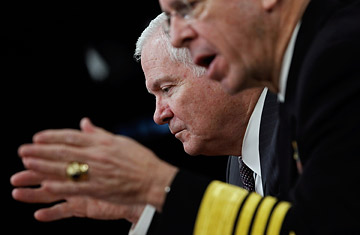
Secretary of Defense Robert Gates and Chairman of the Joint Chiefs of Staff Admiral Mike Mullen speak about the F-35 Joint Strike Fighter program
Test pilots call it "expanding the envelope," and it means flying a new aircraft at varying speeds and conditions to ensure it's safe to do so. That blazes a trail for other pilots to follow. In the same way, Defense Secretary Robert Gates is expanding the envelope for military accountability.
There have been so many heads lopped off at the Pentagon since Gates took over in 2006 it's almost as if he has launched a second French Revolution. First to go in early 2007 were a handful of senior Army brass following the revelations of poor conditions for wounded troops at the Walter Reed Army Medical Center, the Army's flagship hospital. Then, in 2008, he canned the Air Force's top two leaders — one civilian and one military — over their sloppy handling of nuclear missiles and other atomic gear.
But Gates really demonstrated his seriousness earlier this month when he cashiered a Marine two-star general who had been running the Pentagon's F-35 Joint Strike Fighter program, the most expensive weapons system in history, for failing to meet cost and performance goals. Senior officers fumble multibillion programs fairly often, but rarely are they publicly rebuked — never mind fired — for such snafus. "Fundamentally reforming acquisitions, above all, calls on us to foster a culture and practice of accountability — accountability with regard to industry and within the walls of this building as well," Gates said at the Pentagon.
Gates' emphasis on accountability seems to be seeping throughout the U.S. military. While hard numbers are difficult to come by, there's a growing sense — and mounting anecdotal evidence — that missteps once overlooked are now grounds for disciplinary action.
The Navy has been on a real tear, relieving more than a commanding officer a month for the past year, the highest toll since 2003. Some aren't close calls — findings of fraternization and "cruelty and maltreatment" among them — but others are less clear. In two cases in December, ship commanders were relieved not for transgressions but for tolerating transgressions by subordinates.
"The responsibility of the commanding officer for his or her command is absolute," Admiral John Harvey, chief of the U.S. Fleet Forces Command, said after the ouster of one of those two skippers on whose vessel fraternization was rampant (fraternization is a too-familiar relationship, often involving sex, between personnel of differing ranks). "It is our tradition that with responsibility goes authority, and with them both goes accountability," Harvey said in a public statement accompanying the punishment. Military officers talk like this all the time, but in recent years their actions have tended not to match their language.
This cultural shift is even occurring where it has recently been used most sparingly: on the battlefield. That started last year, when Gates removed Army General Dave McKiernan from command of U.S. forces in Afghanistan, ending his career. Since then, several lower-ranking Army officers have received letters of reprimand — a potential career ender — for commanding U.S. troops caught and killed in ambushes in Afghanistan.
But it's not only happening on the battlefield. Last month, Army Secretary John McHugh ordered an "accountability review" to determine if Army officers flubbed their supervision of alleged Fort Hood killer Major Nidal Hasan by ignoring warning signs of his growing Islamic radicalization. The Wall Street Journal reported Thursday that the Army plans to discipline at least six officers for their negligence in the case in coming days.
That's the envelope-expansion effect, where — following the trail cleared by Gates — subordinates know they too can be resolute. "These kinds of things do have a cumulative effect," says Eugene Fidell, president of the National Institute of Military Justice. "You get the sense that Secretary Gates has his hand on the tiller." When the boss makes clear what he expects — and shows there are penalties for falling short — even a bureaucracy as massive as the U.S. military can respond.
